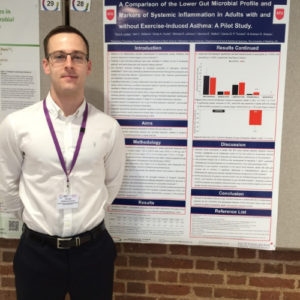
Paul Lester, University of East London, UK
To what extent do you think COVID-19 has impacted physiology teaching?
I worked as a lecturer at the start of the pandemic, then went into Public Health and returned to academia as the pandemic came to an end. I think the pandemic has had a substantial impact on resource-intensive disciplines, such as physiology, as students have not been able to access the facilities required to develop the practical and interpersonal skills to work as an exercise physiologist. Relatively speaking, this may put current students at a disadvantage compared to their pre-pandemic counterparts, so physiology lecturers (and future employers) may need to be aware of the additional upskilling required and cater for this when planning sessions or training.
How much has the physiology curriculum changed since you were an undergraduate?
In my experience, the curriculum hasn’t really changed much over the last ten years in terms of the topics covered. I’ve lectured at three different institutions and the basic curriculum appears to be similar at those universities. What does change however, is the expertise of lecturers at specific institutions and the facilities available to deliver engaging and impactful sessions, such as environmental chambers. Most of the same foundational resources are used, just simply newer editions of textbooks. With that in mind, students should make a point of researching what a given universities specialist areas of research or key collaborations are as they begin to decide where to apply, as this may guide to some extent the opportunities available to them and future career paths.
From a practical perspective, I think more could be done to bring in actual clients and industry-relevant projects for students to work on at the start of their degree, whether that be university sport teams or local clubs.
What support could help early career lecturers?
Beginning a career in academia typically involves committing a substantial amount of time to developing teaching resources and completing teaching related qualifications. More support could be provided to help early career lecturers obtain physiology specific accreditations through governing bodies such as BASES. This may help increase the level and quality of consultancy and research that staff can conduct, which in turn may create greater opportunities for students to get involved.
What change would you like to see in your field?
Given the volume and quality of graduates, it is becoming increasingly difficult for students to obtain those key next-steps, even with a good degree classification and experience. This is further compounded by the cost-of-living crisis, and the increased number of students having to work (sometimes in jobs unrelated to their studies) to support themselves while studying.
One of the major changes that might be needed is to ensure courses formally provide direct routes into key professions, such as clinical or occupational physiology, rather than simply signposting to these as options to pursue after graduation. This partly comes back to the point about students thoroughly researching the specialist areas of each university they are interested in, but also for academic staff to align courses to accredited pathways.

